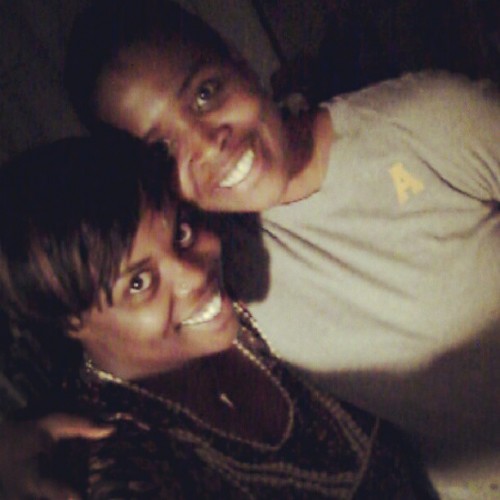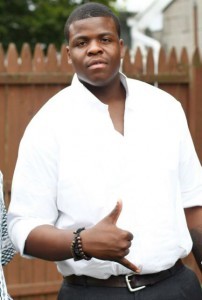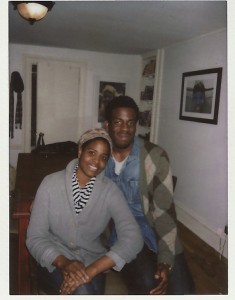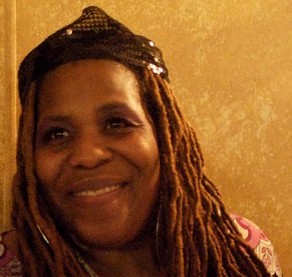Family Responses to Hurrah’s Nest
In an effort to really understand how my family received the poems from Hurrah’s Nest, especially the ones that speak directly to them and their experiences, I’ve asked them to comment on “their” poems. It is good to hear and know how they’ve experienced a moment we’ve all shared, thereby making the moment fuller and carried communally, instead of individually.
A YEAR OF HURRAH: NIGEL RESPONDS TO “MY LITTLE CHULETA”
Hurrah’s Nest turned a year old last week, on February 3. It has been an amazing year, filled with a lot of surprises. The NAACP Image Award nomination being one. Mostly I’ve enjoyed the opportunities to meet people. Having people thank me for my work validates all that time spent alone, hassling over the order of words. I want to thank everyone for reading my poems, supporting me in whatever way you did; to my family for being big champions and good friends. To my fiancé who puts in all those hours driving me from reading to reading, listening to me complain and whine, and being there to rub my back when the nerves get the best of me. These are the things poems are made from.
To celebrate Hurrah’s Nest first birthday here is the last installment of my family’s responses to the poems from the collection. “My little chuleta,” inspired by seeing my little brother Nigel, less than a year old, walk for the first time. (He’s not little any more–he’s a big guy now!)
My little chuleta
The beans are shinier, blacker in water, their skins now split. In the kitchen to get a drink of something, the sun’s coming up and the day is still. I’ve memorized vocabulary words for the Spanish test today. Nigel helped. I pronounced chuleta out loud and he stood at the other end of the hallway, supported by the sky-blue ball. I have never seen him this way; he was as foreign as the words in my workbook—I’m better at reading than speaking, and Mr. Gongora can try to correct my pronunciation, but how I said it made a baby stand. Chuleta, chuleta, he stepped. Chuleta, he walked. Chuleta, I opened my arms and he ran his life into mine, and I didn’t know first steps could flood my heart. Felt good to scream, excited for something not aloneness and another’s death. Niesey came from the kitchen, left the beans soaking, alarmed an emergency was happening close on her watch—What is it? I’m not supposed to drink juice from the carton but that’s what happens with the early bird—you don’t see her catch.
SHAQUANA RESPONDS TO THE POEM “SISTER”

Sister
I selected your name from the tagged partition
in the Black Pearl taxicab. Shaquana, the one who defies
in permanent marker, you are bold letters among faded
ink-whispers of people afraid to make their mark too strong.
Born to us with six-pointed hands, newborn half fingers
planted with a seed of bone, a possibility of intricate cross hatches
and indelible strokes, an isotopic rising and dipping of terrain.
You lined with a person’s symmetry and pointed it right into their face.
On that night, your hands broke the hold Cornel had on me.
In my left eye, our mother is statue.
Her hands lack dexterity for saving.
He’s in my right eye, drunk and primed—
the man you’ve disowned as your father.
He chokes me into a silence that turns
everything purée, telling me he loves me.
My eyes focus on you, and you see I am in need.
Your scream cuts the silence;
you lift your arms and the vase cries down.
He releases me to catch blood and glass.
You flee for the police. Shaquana, your flight, my first breath.
The poem “Sister” was an honor. It was one of those moments that you never knew how much you changed someone’s life until they do something to thank you. I must say it was automatic tears when I first read it, a reminder of all things that were bad, but a reminiscent moment of how much I’ve grown! Five-plus years ago I would have cried about this poem and been bitter but today I cry because I’m so thankful and blessed for the chance to be so full of life, and happy.
I remembered the day like it was yesterday. I’m naturally overprotective, the youngest daughter with the biggest bark. It hurt to go against my father, but for me, I didn’t see him as a father, I saw him as an intruder, hurting a family that did nothing to him, a family full of love and life and he had no right messing with that. To see my sister with that amount of fear in her eyes is the most memorable moment of that experience. I knew without question that someone had to save her. Mom was in shock and I was in rage. I was 13 and in that moment I turned into his equal. It was a matter of right and wrong and before anything I knew that my sister would be the one there for me when I needed her to be, so without question I had to do what I felt was right.
It was definitely one of those experiences that changed my life. It made me more aware that everything isn’t so sweet. I had to grow up faster from that experience but at the same time I’m so thankful for it because I smile harder every day. I’m able to appreciate life around me. I don’t hold grudges because of it; I forgave my father a few years after that and once I did that I felt so relieved. I felt that if I could forgive him for the years of torment I could forgive anyone. Mentally, I’m in the best point in my life. To be only 23, and know myself so well makes me happy. And only through that experience would I have been able to do that.
I’m happy for Hurrah’s Nest, for Arisa—to write about family experiences and going against the saying “what happens in the family, stays in the family” is big, especially in our family. To all the people who have negative comments about it, clearly don’t understand. To those who appreciate it, like myself, I’m happy she’s telling a story that could change people going through something similar.
Everyone has a story but what matters is how you let those life experiences affect your life, positive or negative. Arisa decided to turn it into something positive. Being brave enough to tell a story that had an impact on her life helped her grow and get over it, and I appreciate her for that. Now put that in your pipe and smoke it.
That’s my sister! I love you, Shaquana. Thank you for sharing—you continue to open my heart.
IBERT RESPONDS TO THE POEM “IBERT’S SICK”
Ibert’s sick
My mother splits the cotton ball mitotically,
inserts it in the ear that dribbles hydro-peroxide.
My brother flinches, her fingertips linger like leeches.
The scar: swollen strait of keloid flesh,
runs from earlobe over jugular’s pulse.
Doctors serrated him open
to test why the two siamesed knots
swell to the size of his fists.
My mother and I go to the Children’s Hospital;
Happy to see us come with pizza, we stay
until his sleep is marked by drool on the pillow.
She, to his shoulders, brings the covers.
Stitches woven in like barbed wire make his flesh pucker.
I kiss him goodbye. We leave him in the dark.
Now my mother wraps this diagnosed rare condition;
the same flannel shirt he wore a few months ago
yokes the Tiger Balm heat to his neck.
He leans, adjusting to the elephantine limb
that holds head to shoulders.
He talks and one eye meets mine.
I step close, lassoed by camphor and fever,
to hear words mouthed into collarbone:
Bring me back ten Sour Powers, Risa.
He’s eight and I walk to school alone
with another candy request
for the second time this week.
What do you think about this poem? (or what is your experience of this poem?)
I remember it as it’s stated; however, it also takes me back to walking to school from our apartment on 1625 Fulton Ave in Bed-Stuy to our elementary school, PS 21, across from the Brevoort Housing Projects, and all the sights and sounds along the way. I also recall the storm grey building of PS 21 where I spent about 4 years of my primary school education. I recall falafels, tofu, and Morningstar soy patties given to me as my bagged lunch. (We were vegetarians for a long while.) I also recall Mrs. Gates, my 1st grade teacher, who I would frequently go home with and play with her similarly aged children. I know this poem focuses on my past sickness but it also takes me back to a time that I can’t say I would be excited to return. It’s a recall of a mixed bag of memories and emotions but on balance–I feel halcyon days these weren’t.
What do you remember from the moment talked about in the poem? What is your memory?
The interesting thing about this poem is that it could easily pass for an amalgam of all the times I was sick when I was younger. There were a lot. Every time usually played out the same. Specifically, I dealt with frequent, and still partially inexplicable, infirmed lymphoid glands. (One day I’ll make a point to get the exact medical terminology describing what was the cause of the painful tumescence of my neck.) Over the course of the years we developed a number of ways to treat the pain. What I distinctly remember is that none involved aspirin, Advil, etc., or conventional medicine; it was all pure homeopathy–a holdover from our days as a Rastafarian household. So when note is made of the cotton ball being split and peroxide being put on it and the Tiger Balm–it’s all true. Neicey would alternate between putting peroxide or some form of anointed palm oil in my ear canal on the side of my face that was swollen. I can’t really say whether or not it actually worked in relieving my pain but it always felt like love.
One of the two times I had surgery on my neck it was done at the Children’s Hospital. My stay in the hospital disrupted the daily rhythm between me and Arisa. We walked to school together everyday so it’s safe to say that we spent the most time together amongst the siblings. In asking her to pick up some Sour Powers, I knew that she knew exactly where to get them from: at the corner store across from the school. Sour Powers were, and still, a favorite of mine. I used to dream of being able to buy a whole case to eat on my own. (I also had a significant amount of cavities at this time.)
How does this experience/moment nest in you now–how have you made use of this experience to know yourself better?
Reading this poem brought back all sorts of emotions. Primarily, I think it really made me think about the inner-city world that we came from. I frequently forget about many of the little kinks and quirks of inner-city life. It can be hard on a kid. I do remember it being hard at times. I was sick a lot, there wasn’t a definitive answer communicated to me as to why I was having these experiences. Looking back and reading the medical records, I could see that the doctors really had no idea either. One record stated that they even tested me to see if I had HIV. I was eight years old at the time. Sounds even crazier today. I relate this to inner-city life because it all just felt very hectic and unclear. Today my health is very important to me. I’m very conscience about what I eat, drink, and do to my body. I’m 50/50 on treatment and homeopathy. I do wish I received more conventional treatment at the time especially when the pain was at its most urgent. But ultimately, today, I would say I’m very aware of how vulnerable and fragile we all are because of my past sickness. I’m sure there are a myriad of other ways how this experience has affected me but until now I can’t say I’ve really sat to think about it.
Thanks, Ibert. I love you!
A MOTHER’S RESPONSE TO “ON THAT DAY”
“On that day” is a poem that recalls one of those difficult days, when everything seems to go not as planned; and as a result, there are consequences we all have to live with. Some more than others.
On that day
the uniformed men told us we were coming with them.
I was too busy getting Kayana ready, I didn’t notice
I was still in my pajamas, and the hairstyle you did
the other day needed to be combed.
You woke up from the anesthesia, took the train half drugged.
On that day, Jamar, me, and Ibert sat in the air-conditioned police station,
drinking apple juice. The white cops told us, Better not see you here again.
They laughed. We imagined Kayana alone in the hospital shaking.
On the train you fell asleep, opened your eyes
just before our stop. We wondered where you were
while rubbing goose bumps down, watching pistachio
paint peel, listening to our hunger come.
On that day the apartment was too quiet a place
for living children, you cried, and we let our minds wander.
Your head begged for bed; you called
your best friend on that day and asked her to get us.
Walked on legs withering beneath you
to Kayana in the hospital five blocks away.
Later in Angie’s doorway, Ibert hugged your thighs,
rested his head between your legs. We shouted,
Where you been? On that day, without a reply,
we calmed our excitement to enter your hush.
My mother’s response: That poem took me back to a dark place in my life. I made a sacrifice to give up a life and in the interim my living lives were being traumatized. On that day I called my sister to come and get you guys but she thought I was neglecting my motherly duties. When I thought I was performing a secret act, it actually became known openly—trying to shield my children, myself, and the world from my dirty deeds. I was a very private, internal person so to feel so helpless and vulnerable continues to haunt me. It still hurts; you exposed me. And although it’s still hurtful, I find that these are the issues that I need to work on in order to heal and find peace with my past.
You made my family also come into my world—the world, which I refuse to talk about. Everyone that read your book views it as you being bitter against me and they are also glad you did not expose them. I gave it to my friend and she read it and was so glad you did not mention her. There are secrets that she was not ready for the world to know and would love to take them to her grave. Aubrey became nervous to tell you the family lineage because he was fearful you would use it to your advantage. Your aunt had to put it down and said she was going to get on your case for putting those family secrets in print. Your uncle Andre could not put it down; it continue to intrigue him because he was learning about you, as was the case with Shawn—he became closer to you because you was this mystery, a phantom, and if they could understand why Arisa is “gay” then this gave them a clue into your space, our space.
Despite, my initial feelings, I embrace the good and the bad. I am free. Although some knew the struggle, they did not know the intensity. They gave me my accolades for triumph and I am still holding on . . . I am able to put it on the altar and my sins become washed. I serve a forgiving Father who washes our sins away—just not too sure about man . . . LOL. I am aware I was not able to love you like you needed to be loved and you being my first born daughter, I only knew how to raise a male child who did not require the tenderness, the feminine nature that is in a female bones. I really had walls that I did not allow my children to penetrate. Yes, I became my mother who was my example of how to mother.
Come my child, let me give you a hug and hold you so you can become whole. I too never got that, she never got that, and you never got that, so we cry and move on. But you had the courage to talk about it. I love you even more.
Thank you, mom!


